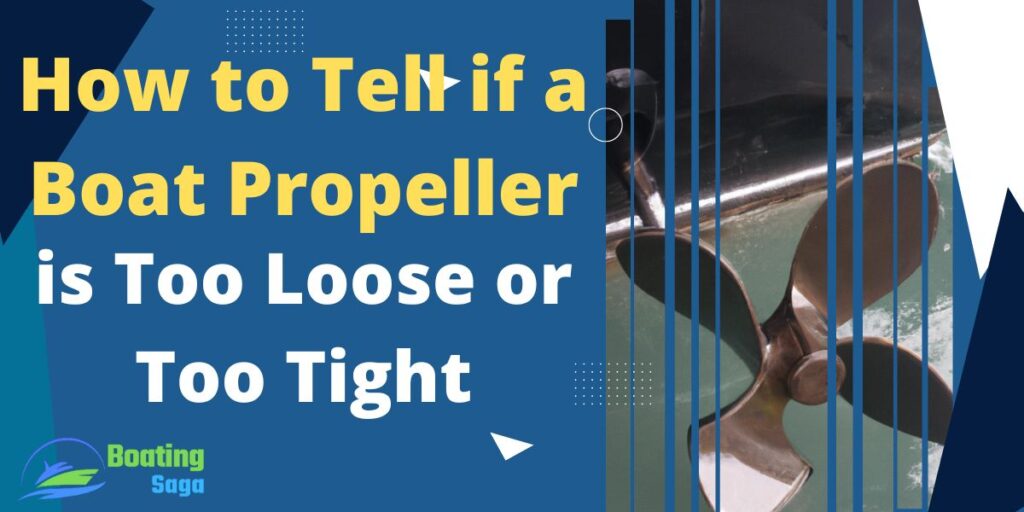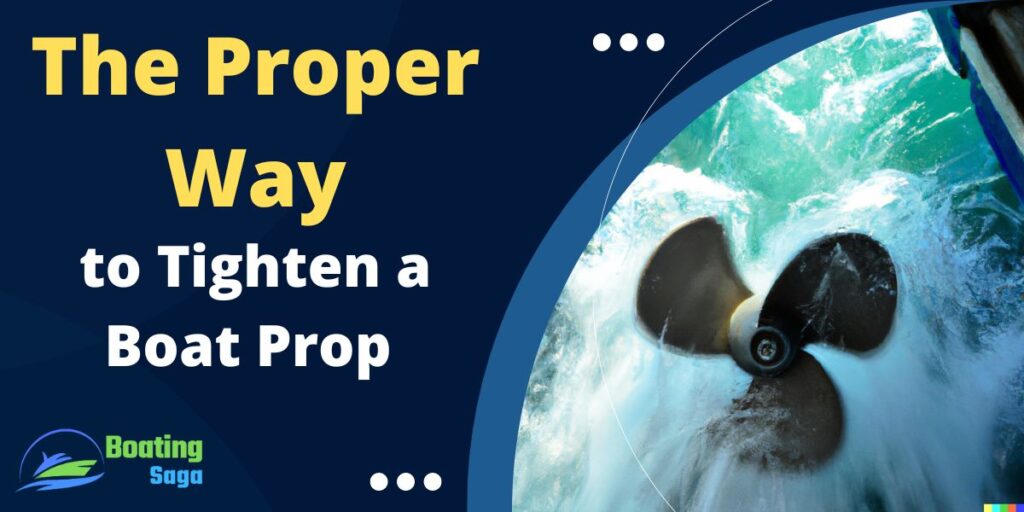
A boat’s propeller is one of the most important parts of the vessel, providing thrust to move the boat through the water. The propeller is attached to the engine via a shaft, and at the end of this shaft is a nut that can be tightened or loosened to adjust the tension on the propeller. Sometimes a boat propeller can’t spin freely if tight ain’t well and properly.
So, how tight should a boat prop be?
The answer may depend on your particular boat and engine setup, but in general, it’s best to err on the side of caution and tighten the prop until it’s snug. This will help ensure that your prop stays in place and doesn’t cause any damage to your boat.
If you’re not sure how tight to make the prop, it’s always better to err on the side of caution and make it tighter than necessary.
Tight Propeller is Important
Tight Propeller is important for many reasons.
A tight propeller is important because it helps the boat move more efficiently through the water. A loose propeller can cause the boat to vibrate, use more fuel and sometimes can make noise which could be unbearable . A tight propeller also helps to protect the engine and gearbox from damage.
If you notice that your propeller is loose, you should tighten it as soon as possible. You can do this by adjusting the tension on the propeller shaft or by replacing the prop nut with a new one. It’s important to check your props regularly so that they stay in good condition and your boat can operate at its best.
How to Tell if a Boat Propeller is Too Loose or Too Tight

There are a few telltale signs that will help you determine if your boat propeller is too loose or too tight.
- First, try to wiggle the propeller blade. If it moves more than a few millimeters, it is probably too loose.
- If the propeller is too loose, you’ll likely notice a decrease in performance and fuel efficiency. The engine may also run louder than normal and vibrate more than usual.
- Check to make sure the propeller nut is secure. If it is not, then the propeller is most likely too loose.
- Sometime loose boat propeller can can cause oil leak or spilling which can be visible easily.
- Additionally, the boat may be difficult to steer and there may be excessive vibration coming from the engine.
- Finally, try turning the propeller by hand. If it does not turn smoothly, or if you feel resistance, then the propeller is probably too tight.
If you’re unsure whether or not your propeller is too loose or too tight, it’s best to consult a professional for help.
The Consequences of a Loose Boat Prop
If your propeller isn’t secured properly, it can cause a lot of damage to your boat and put you in danger. Here are some of the consequences of a loose boat prop.
- Your boat can be severely damaged if the propeller falls off. The blades can cut through the hull or damage the engine, and it can be very expensive to repair. Even if the damage isn’t severe, it can still be costly to fix.
- A loose propeller can cause vibration and noise. Not only are these things annoying, they might be dangerous as well. The vibration can damage your engine and other parts of your boat. In extreme cases, it can even cause the engine to fail.
- You also put yourself at risk when the propeller comes loose. If you’re driving the boat, the blades can easily slice through your skin. And if you’re swimming near the boat, there’s a danger of getting hit by the propeller. In either case, it’s not worth taking the chance.
If you think your propeller is loose, it’s important to get it checked out by a professional as soon as possible.
The Effect of Loose Propellers
For starters, loose propellers can cause the boat to vibrate, which can be extremely annoying for passengers.
Another potential effect of a loose propeller is noise pollution. Since the propeller is not securely fastened, it will create a lot of vibration and noise as it spins. This can be disruptive to other boats nearby, as well as to marine life.
Additionally, it can also put extra strain on the engine, which can lead to increased fuel consumption and decreased performance. In worst case scenarios, a loose propeller can even detach from the boat entirely and become a hazard for other vessels.
To avoid these issues, it is important to regularly check your propeller for tightness. If you notice any looseness, be sure to have it tightened as soon as possible. This is a simple task that any qualified marine mechanic should be able to handle quickly and easily.
The Proper Way to Tighten a Boat Prop

While it may seem like a straightforward process, there is a right way and wrong way to tighten a boat prop. If done incorrectly, it could result in serious damage to the propeller or even the engine. Here are the steps you need to take to ensure you’re tightening your boat prop correctly.
- First, make sure the propeller is in the correct position. The blades should be facing forward and the hub should be level with the ground. If the propeller is not in this position, it could cause damage when you start the engine.
- Next, use a wrench to tighten each of the bolts that hold the propeller in place. Do not overtighten these bolts, as this could strip them or break them entirely. Just snug them up until they are snug against the propeller hub.
Once everything is tightened up, give the propeller a spin by hand to make sure it’s not binding up anywhere.
Conclusion
From the above discussion, I hope you got the answer that, how tight should a boat prop be?
It is important to check your boat prop regularly and tighten or loosen it as needed. A loose prop can cause damage to your boat, while a too-tight prop can cause problems with steering.
As a general rule, the nut should be turned clockwise to tighten and counterclockwise to loosen. Check your owner’s manual for specific instructions on how tight to make your particular boat prop.
With a little trial and error, you’ll find the perfect prop tension for your boat!
You might also Like this Interesting Topic about Propeller: The Titanic’s propellers had 7 interesting facts


